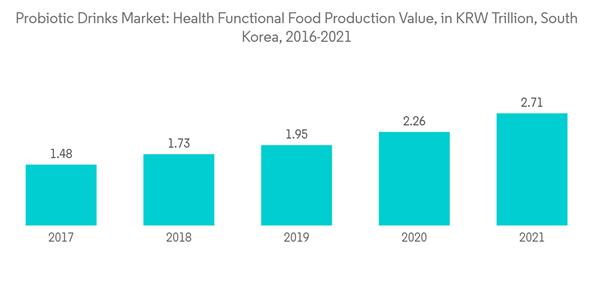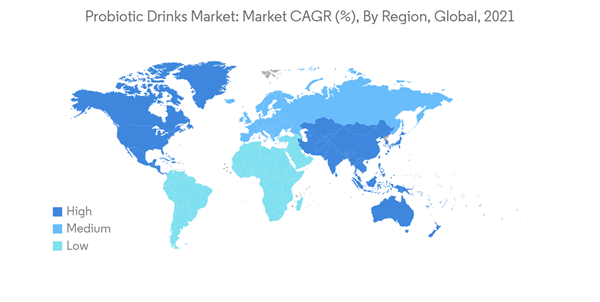The probiotic drinks market is growing because of its nutritional benefits. Probiotic drinks promote gut health and digestion; they also improve mental health and reduce the risk of allergies, among other benefits.Due to these multiple benefits, consumers prefer probiotic drinks over regular soft drinks. There is an increasing demand for pure and natural ingredients in probiotic drinks, which has led the key players in the market to expand their product offerings with an extensive range of authentic fruit-based probiotic beverages.
The millennials, being technologically advanced, update themselves with the facts related to health, thereby amending their food habits accordingly. Also, fitness and workouts are a trend among consumers due to obesity and overweight problems. Due to this, low-calorie, plant-based, and functional foods are preferred by consumers. Moreover, probiotic fruit juices and probiotic vegetable juices are healthy and refreshing. They act as a pleasing taste profile for a wide range of consumers, ranging from younger generations to adults to kids. Furthermore, the market is characterized by product innovation, launches, mergers and acquisitions, technical expertise, and a diversified product offering to attract consumers. For instance, in January 2021, GoodBelly launched an online store where consumers can purchase juice drinks and shots and get them delivered to their doorstep.
Probiotic Drinks Market Trends
Growing Demand for Functional Beverages
In the global market, functional beverages from Japan have become an integral part of the beverage industry. There are many nutritional benefits offered by functional beverages that can positively affect the health of consumers and may be difficult to obtain through a regular diet. The rising consumer focus on health and wellness, especially among the younger generations, is driving a forceful demand for functional beverages to meet their needs. Presently, probiotic drinks are flourishing in the functional beverage market. These functional beverages provide numerous health benefits in addition to quenching thirst. The drinkable yogurt segment significantly contributes to the dairy-based probiotic drinks segment, driven by the inflated demand for convenient digestive supplements. With a variety of flavors to choose from, consumers can combine the benefits of probiotics with their favorite flavors to create a refreshing and revitalizing drink rather than medicine.Furthermore, with the increasing demand for clean-label products and plant-based ingredients, manufacturers operating in the dairy space are investing heavily in product innovation to cater to the ever-increasing consumer demand. In August 2021, Pillars Yogurt LLC launched a new organic coconut probiotic yogurt. The yogurt is made with less sugar, more protein, functional fats, and a blend of pre- and probiotics, which help support gut health.
Asia-Pacific Remains the Fastest-growing Market
China, Japan, and India are the key markets in the region. According to the International Probiotics Association (IPA), China is one of the most important markets for probiotics in the world. Producers and suppliers have been witnessing a significant increase in sales nationwide. The majority of probiotics are consumed in the form of yogurt and fermented products. Probiotic drinks, such as drinking yogurt, have been experiencing increasing demand from the region.Furthermore, kombucha is increasingly penetrating the market. Also, the market demand is further driven by the country's millennial population's continuous inclination toward healthy lifestyles. Probiotic drinks have become part of the daily diet. These factors are, in turn, driving the overall sale of probiotic drinks in the country. For instance, in March 2021, Australian probiotic technology brand PERKii launched its new 100% plant-based, non-fermented Sparkling Probiotic Drinks. To compete with kombucha, PERKii's non-fermented Sparkling Probiotic Drink was available in 700 Coles supermarkets. Furthermore, considering the demand for probiotics and the aging population in the country, market players are innovating new products for consumers. For instance, in April 2022, China Dairy Giant Yili launched a solid beverage formulated with probiotics and GABA as the critical ingredients in China.
Probiotic Drinks Industry Overview
Some of the major players in the region are Fonterra Co-op Group Ltd., Yakult Honsha Co. Ltd., Groupe Lactalis, Groupe Danone SA, and Kerry Group PLC (Bio-K Plus International Inc.), among others. The leading players in the probiotic drinks market enjoy a dominant presence worldwide. Brand loyalty among consumers gives these companies the upper hand. Major players are focusing on introducing new products to the market to ignite the interests of consumers. New product development is the most preferred strategy in the global probiotic drinks market. Furthermore, the key players are embarking on mergers and acquisitions as one of their key strategies to achieve consolidation and optimize their offerings. Certain players have been expanding their geographical presence by acquiring or merging with manufacturers in the domestic market.Additional Benefits:
- The market estimate (ME) sheet in Excel format
- 3 months of analyst support
This product will be delivered within 2 business days.
Table of Contents
Companies Mentioned (Partial List)
A selection of companies mentioned in this report includes, but is not limited to:
- Fonterra Co-op Group Ltd
- Yakult Honsha Co. Ltd
- PepsiCo Inc.
- Groupe Lactalis
- Groupe Danone SA
- Kerry Group PLC (Bio-K Plus International Inc.)
- Lala Branded Products LLC
- Lifeway Foods Inc.
- Harmless Harvest Inc.
- Obi Probiotic Soda










